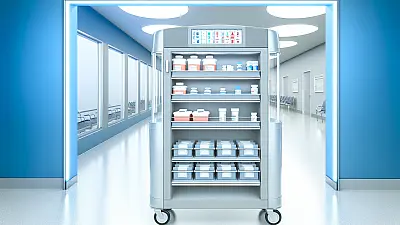GLENDORA, CA - State inspectors documented multiple violations at Arbor Glen Care Center after finding that nursing assistants inappropriately operated tube feeding equipment for a resident requiring specialized nutrition support, creating potential safety risks.

Unauthorized Operation of Medical Equipment
During a March 20, 2025 inspection, state surveyors observed a certified nursing assistant (CNA) independently operating a tube feeding machine for a resident who depended on the device for all nutrition. The resident had been admitted with dysphagia (difficulty swallowing) and failure to thrive, requiring a surgically placed gastrostomy tube to deliver nutrients directly to the stomach.
At 5:20 AM, inspectors observed the CNA providing care to the resident while the tube feeding machine displayed "holding," indicating nutrition delivery had been paused. After completing care, the CNA restarted the machine to "running" status without involving licensed nursing staff.
When questioned about the action, the CNA stated: "CNAs were not supposed to turn residents' tube feeding machine on and off. Licensed nurses were supposed to turn residents' tube feeding machine on and off for the CNAs." The assistant explained the machine was restarted to prevent alarms that might wake other residents.
Scope of Practice Violations Create Safety Concerns
The incident revealed a pattern of unauthorized practice among nursing assistants. A second CNA interviewed stated it was "common practice" to put tube feeding machines on hold during resident care and restart them afterward, despite knowing only licensed nurses should operate the equipment.
According to California Health and Safety Code, certified nursing assistants may only perform basic patient care services that do not require licensing, and must work under supervision of registered or licensed vocational nurses. Operating tube feeding equipment falls outside this scope of practice.
The facility's Director of Staff Development confirmed that CNAs receive no training on tube feeding machine operation and are specifically taught during orientation not to disconnect or operate any equipment connected to residents. The Director of Nursing emphasized that tube feeding constitutes medication and treatment administration, which exceeds CNA authorization.
Medical Risks of Improper Tube Feeding Management
Tube feeding requires precise monitoring and adjustment to prevent serious complications. Improper machine operation can lead to aspiration pneumonia if feeding rates are incorrect, electrolyte imbalances from interrupted nutrition delivery, and mechanical complications including tube displacement or blockage.
Residents receiving gastrostomy tube nutrition are often medically fragile with compromised swallowing reflexes and underlying conditions requiring careful nutritional management. The physician had ordered specific feeding parameters - 55 milliliters per hour for 20 hours daily to provide 1,100 ml and 1,650 calories - that require adherence to prevent malnutrition or overfeeding complications.
Licensed nurses are trained to recognize signs of feeding intolerance, monitor for complications, and adjust delivery rates based on medical orders and resident response. Unauthorized operation by untrained staff removes these critical safety measures.
Industry Standards Require Licensed Supervision
Standard nursing home protocols require licensed nurses to initiate, monitor, and adjust all tube feeding operations. When CNAs need to provide care that requires interrupting feeding, they must notify licensed nurses to safely pause the equipment and restart it afterward.
The facility's own gastrostomy tube policy, dated February 8, 2021, designates tube feeding management as a licensed nurse procedure. This policy aligns with federal regulations requiring appropriate staff competencies for resident care and state regulations governing nursing assistant scope of practice.
Proper protocol would involve CNAs requesting licensed nurse assistance before providing care that requires feeding interruption. If the assigned nurse is unavailable, another licensed nurse should be contacted to ensure safe equipment operation and continuity of prescribed nutrition therapy.
Competency Gaps Identified
The inspection revealed that tube feeding management was not included in the facility's CNA competency reviews and skills checklists. This gap prevented proper assessment of whether staff understood appropriate boundaries and protocols for residents requiring specialized nutrition support.
Federal regulations require nursing homes to ensure all staff have appropriate competencies to maximize resident well-being. The facility's failure to include tube feeding protocols in competency assessments contributed to the unauthorized practice patterns observed during the inspection.
Additional Issues Identified
The violations also highlighted broader concerns about staff education and supervision practices. The facility's training programs did not adequately address the specific needs of residents requiring enteral nutrition support, and supervisory oversight failed to detect the ongoing unauthorized practices among nursing assistants.
The inspection findings demonstrate the critical importance of maintaining clear scope of practice boundaries and ensuring adequate staff competency verification for specialized medical procedures in nursing home settings.
Full Inspection Report
The details above represent a summary of key findings. View the complete inspection report for Arbor Glen Care Center from 2025-03-20 including all violations, facility responses, and corrective action plans.
💬 Join the Discussion
Comments are moderated. Please keep discussions respectful and relevant to nursing home care quality.